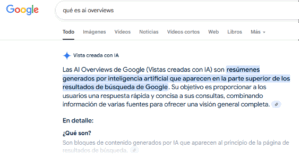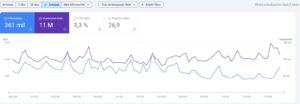08/09/25
SEO vs SGE: when the answer continues to be to do good SEO
For years, the great goal was clear: to be in the top 3 of Google. But in 2025, that goal is no longer enough.
With the arrival of AI Overviews, the Google search engine no longer first shows you a list of links. Now, in many searches, the user directly sees a summary generated by artificial intelligence with the information they need… without the need to click.
And that raises a strategic doubt for many brands:
Should we continue to do SEO or focus solely on appearing in those AI-generated answers?
The new scenario: the AI generates the answer in the first position.
Google officially introduced AI Overviews on May 14, 2024, as part of its SGE (Search Generative Experience) project in the U.S.
In Europe, after tests in March 2025, Google officially activated them on March 25, 2025, in nine European countries: Spain, Germany, Austria, Italy, Belgium, Ireland, Portugal, Poland and Switzerland, with a progressive expansion to the rest of European countries before the end of 2025, once the EU regulation is met.

These AI Overviews typically appear above organic results, ads, and traditional links, although in recent months we’ve seen Google testing them and have even seen them in other parts of the results pages.
However, they do not replace SEO: AI Overviews they reflect well-done traditional SEO.
Do you want to appear in AI Overviews? Do SEO.
AI Overviews do not generate original content. They select from content that is already created, reorganize it, and present it. To be selected, sources must meet clear criteria: authority, structure and clarity.
A studi by Ahrefs in May 2025 revealed that 76% of the pages cited in AI Overviews were already in the top 10 organic results on Google. What this tells us is very simple: If you don’t do SEO, you won’t appear in either classic or AI-generated results.
To be in the AI Overviews, you don’t need to reinvent the wheel, you just need to refine your current SEO with more demanding criteria.
Here are some practical keys for your content to be eligible as an AI source:
1. Schema Markup
Implement structured data (Article, FAQ, HowTo, Product, etc.). This allows search engines to accurately understand the function and content of each page.
If you don’t speak the language of AI, it won’t understand you.
2. Highlight the thesis of your content
The most relevant information, your main argument, or the most valuable insight should appear in the first few paragraphs so that the idea of what we are going to talk about is understood from the outset and there are no misunderstandings. AI prioritizes what it finds first.
3. Useful and well-structured content
Use hierarchical headings (<h2>, <h3>), lists, bullets, tables, and brief sections. This makes it easier for both the reader and the AI to scan and understand the content.
4. Clear and accessible navigation
A clear navigation structure and well-distributed internal links help AI understand your thematic architecture and information hierarchy. That’s why it’s highly recommended to also add a table of contents, especially on pages with a lot of information.
5. Long-tail keywords
Searches that trigger AI Overviews are usually more specific and conversational. Optimizing for long-tail keywords makes you more relevant for those complex and contextual queries that are looking for something very specific.
6. Let others talk about you. You decide if it’s good or bad
AIs tend to cite sources that not only publish good content, but are also mentioned by others in different contexts. The more external presence you have—on forums such as Reddit or Quora, in the media, or on pages such as Wikipedia—the more authority language models perceive you to have. These mentions, which you should keep in mind in your link-building strategy, reinforce your relevance and increase the chances of AI selecting you as a source.
The crocodile bite, the collatera damage.
One of the most commented collateral effects after the deployment of AI Overviews is what Roberto García defined on LinkedIn as the “crocodile effec”:

In Google Search Console, you begin to see that impressions grow (because you appear in the AI summary), but clicks decrease (because the user no longer needs to click on any link), forming what looks like a crocodile’s mouth with its teeth and everything.
This has two important implications:
- Your results appear on Google, but the public does not click because they stick with the result of the Google-generated answer.
- Even so, SEO remains fundamental. In the short term, the lower number of clicks does not always imply a drop in revenue. However, if your business depends exclusively on traffic from purely informational websites and you perceive that your income is at risk (because you lived on clicks to your website), it is crucial to adapt your strategy. You must look for new ways to show your content and not depend solely on Google. It is also time to re-evaluate how you measure conversions to adapt to this new scenario.
The rise of acronyms… and the return to the essential.
In the last year, digital marketing has been filled with new acronyms to name each new trend:
-
LLMO – Large Language Model Optimization
-
GEO – Generative Engine Optimization
-
AEO – Answer Engine Optimization
-
AXO – AI Experience Optimization
-
APO – AI Prompt Optimization
-
AMO – AI Mention Optimization
-
ATRO – AI Trust & Retrieval Optimization
… and many more.
Necessary? Yes.
Confusing? Many times.
Do they replace SEO? No.
It’s the same thing that happens with local SEO: it has its own techniques, but it is still SEO. It just requires applying the principles of classic SEO to the context we have before us.
And that’s precisely what happens with most of these new acronyms: You don’t need five different strategies. You need one SEO strategy with vision, structure, and adaptability.
And what about ChatGPT, Perplexity, or Claude?
Although Google continues to dominate the market, we cannot ignore the rise of the other LLMs. According to a study by First Page Sage conducted in July 2025::
-
Google maintains 81.6% of the global search share.
-
ChatGPT, although it only accounts for 9%, represents a significant share for a platform that has recently emerged.
- The rest (Perplexity, Claude, Bing…) represent 7.4%.
Even so, user behavior is changing:
More and more people are consulting AI directly for summaries, ideas, complex answers, or comparisons. And when they do, the AI also selects content that is optimized, structured, and reliable.
Conclusion: SEO for AI does not replace traditional SEO. It rewards it.
AI Overviews have changed the way Google presents information. But they have not changed what it values. Google’s AI chooses what you should already be optimizing: clarity, structure, value, and authority.
So if you’re wondering if you should leave SEO behind to focus on these new technologies, remember:
There is no visibility in AI without SEO. And there is no conversion without strategy.
Your content should not only be well-positioned, it must be ready to be cited, read by machines, and valued by humans.
Because in 2025, doing SEO is not about filling Google. It’s about being the source that the AI chooses.




